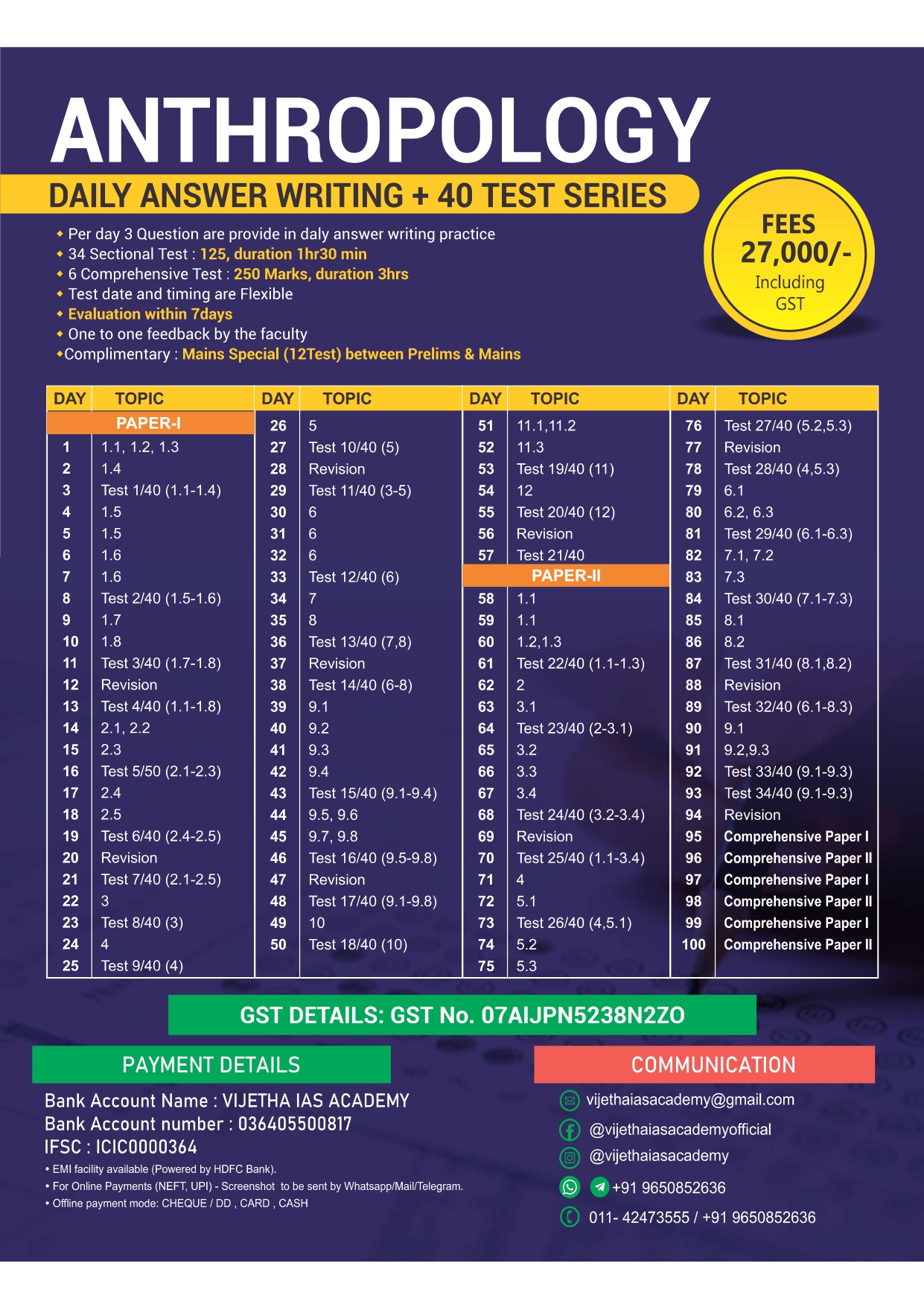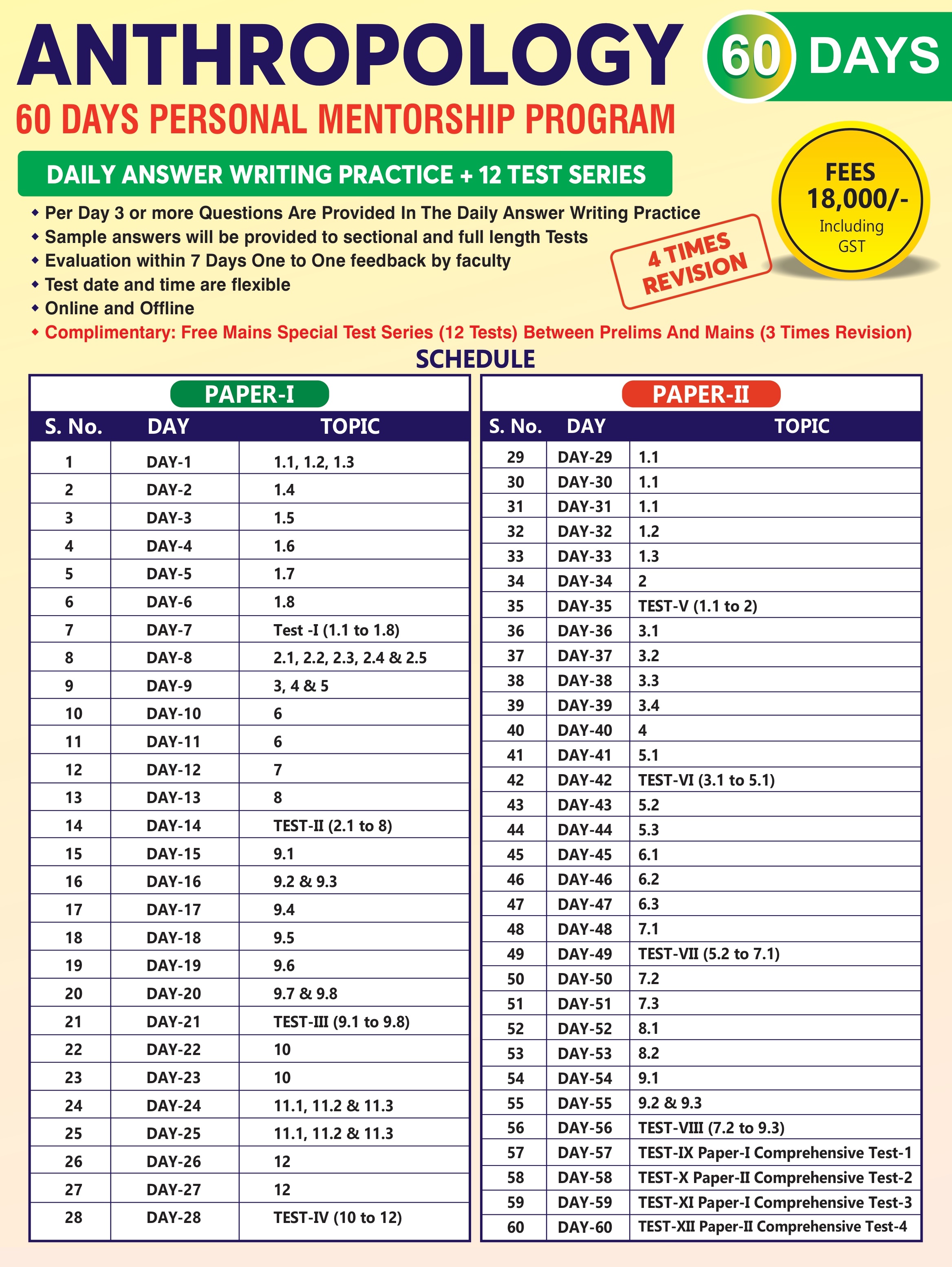
Critically comment on the lifestyle diseases and their impact on human health.
(20 Marks) Anthropology Optional Paper CSE 2024
Introduction
Lifestyle diseases, also known as non-communicable diseases (NCDs), are a group of illnesses primarily caused by unhealthy living habits such as poor diet, lack of physical activity, smoking, excessive alcohol consumption, and stress. Common examples include cardiovascular diseases, diabetes, obesity, hypertension, and certain cancers. These diseases have become increasingly prevalent in modern societies due to urbanization, sedentary lifestyles, and the growing consumption of processed foods.
Main Body
Causes of Lifestyle Diseases:
Dietary Changes: The shift from traditional diets rich in fruits, vegetables, and whole grains to processed, high-fat, and high-sugar foods has led to an increase in obesity, diabetes, and heart disease.
Sedentary Lifestyle: Physical inactivity, often due to desk jobs, reliance on technology, and reduced manual labor, contributes to metabolic disorders, hypertension, and cardiovascular problems.
Tobacco and Alcohol: Smoking and excessive alcohol consumption are major risk factors for a wide range of diseases, including cancers, liver cirrhosis, and chronic respiratory conditions.
Stress and Mental Health: The modern, fast-paced lifestyle often results in high levels of stress, anxiety, and depression, which are linked to both mental and physical health issues, such as cardiovascular diseases and weakened immune systems.
Impact on Human Health:
Cardiovascular Diseases (CVDs):
These include heart attacks, strokes, and hypertension, often resulting from unhealthy diet, obesity, and lack of exercise. CVDs are the leading cause of death globally.
Diabetes: Type 2 diabetes, closely associated with poor diet and sedentary habits, has seen a dramatic rise, particularly in urban populations. Its long-term complications include kidney failure, vision loss, and heart disease.
Obesity: Obesity, driven by overconsumption of calories and lack of physical activity, leads to numerous health complications such as joint problems, respiratory difficulties, and increased risk of cancers and diabetes.
Mental Health Disorders: High stress levels and unhealthy coping mechanisms, such as substance abuse, contribute to the growing incidence of depression, anxiety disorders, and other mental health conditions.
Socio-economic Impact:
Burden on Healthcare Systems:
The increasing prevalence of lifestyle diseases places a heavy burden on public healthcare systems, especially in developing countries where resources are limited. The cost of long-term treatments for chronic conditions such as diabetes or heart disease can be overwhelming for both individuals and governments.
Reduced Productivity: Lifestyle diseases often lead to disability or premature death, reducing workforce productivity and contributing to economic losses. For example, conditions such as obesity and hypertension can reduce the physical and mental capabilities of individuals, thereby affecting workplace efficiency.
Inequality in Access to Care: Access to healthcare for managing lifestyle diseases is often unequal, with lower-income populations being more vulnerable due to lack of resources, education, and healthcare facilities. This exacerbates health disparities in societies.
Global Trends and Anthropological Perspective:
From an anthropological perspective, the rise of lifestyle diseases is closely linked to cultural and economic transitions, particularly the shift from traditional, rural livelihoods to modern, urban living. As societies undergo rapid industrialization and globalization, traditional dietary and physical activity patterns are replaced by unhealthy habits, resulting in widespread health issues. The epidemiological transition theory highlights this shift from infectious diseases as the primary cause of mortality to non-communicable diseases in more developed societies.
Additionally, the cultural adoption of smoking, fast food consumption, and sedentary leisure activities, often influenced by globalization and media, accelerates the rise of lifestyle diseases. This shift points to the need for public health interventions that are culturally sensitive and address the root causes of unhealthy behaviors.
Conclusion
Lifestyle diseases are becoming a major global health crisis, affecting millions of people and posing significant challenges to healthcare systems and economies. The increasing prevalence of these diseases highlights the need for a shift towards healthier living practices, public health awareness, and policy interventions to curb the epidemic. Anthropologists can contribute to understanding the socio-cultural and environmental factors driving these diseases, thus helping design effective, culturally relevant interventions. Lifestyle diseases, though preventable, require collective efforts from individuals, communities, and governments to mitigate their impact on human health.
Anthropology Test Series Programme (Online + Offline))
We provide Anthropology Daily Answer Writing a range of programs designed to cater to various stages of UPSC preparation. Whether you're just starting out, have attempted the Mains before, or are getting ready for Mains 2024, we have the right option for you. Allow us to assist you in choosing the course that best fits your needs.
|
Level of Preparation |
Test Series Program |
Test Series Content |
Test Schedule |
|
Self-study of Anthropology Optional |
Anthropology 100 Days Personal Mentorship Program |
Daily answer writing, 34 sectional tests, 6 comprehensive tests, and complementary Mains Special 12 tests (between prelims and mains) |
|
|
Revise whole syllabus through Daily Answer Writing Practice and Tests |
Anthropology DAW Mentorship Program |
Daily Answer Writing Practice and 8 sectional and 4 Full Length tests |
|
|
Revise whole syllabus through Sectional and Full Length Tests |
Anthropology Tier- I T-40 Test Series |
34 Sectionals and 6 Full Length Tests |
|
|
Written Mains earlier and need more practice |
16-Anthropology Tier II Test Series |
10 sectional and 6 Full-Length Tests. |
|
|
Cleared Prelims 2023 and are preparing for Mains 2023 |
Mains Special 12 Tests program |
8 Sectional and 4 Full-Length Tests |
ANTHROPOLOGY MAINS SPECIAL COURSES
Enroll in our Anthropology Mentorship Program today and take the first step towards achieving your UPSC goals!
1) If you are going for Self study of Anthropology Optional and looking for a Comprehensive Program that includes Daily Answer Writing, 34 Sectional tests, 6 Comprehensive tests, and Complementary mains special 12 tests (between prelims and mains), our Anthropology 100 Days Personal Mentorship Program is the perfect choice.
2) If you want to revise Whole Syllabus through Daily Answer Writing Practice and 8 sectional and 4 full length tests, then our Anthropology DAW Mentorship Program is the best fit for you.
3) If you want to revise Whole Syllabus through 34 Sectionals and 6 Full Length Tests then Anthropology Tier- I T-40 Test Series is for you.
4) If you have written Mains earlier and need more practice, then our 16-Anthropology Tier II Test Series is a great option. This test series includes 10 sectional and 6 full-length tests.
5) if you have cleared Prelims 2023 and are preparing for Mains 2023,our Mains Special 12 Tests program is a must-have. This program includes 8 sectional and 4 full-length tests to help you prepare for the big day.
For more information on Vijetha IAS Academy’s Anthropology mentorship programs Deatils : https://vijethaiasacademy.com/anthropology-test-series
Anthropology 100 Days Personal Mentorship Program ( 7 + 3 Times Revision )

Anthropology 60 Days Personal Mentorship Program ( 4 + 3 Times Revision )

For more information: https://vijethaiasacademy.com/anthropology-test-series
Details Of Anthropology Classes Program
Top Anthropology Optional IAS Coaching Center in Delhi Vijetha IAS Academy | Best Anthropology Optional IAS Coaching in Delhi
Fee Structure:
- Tier 1: Rs. 55,150/- (3 Years Validity of Offline/Live Batch)
- Tier 2: Rs. 42,000/-
- Tier 3: Rs. 36,000/-
Batch Size: 50 – 60 Students
UPSC Notes
Anthropology Optional IAS Coaching Notes, IAS Exam Preparation Booklets, IAS optional coaching Notes, UPSC Coaching Notes, Video Lectures, Live Classes with faculty, Chat Facility Available
Teachers Name: N P Kishore Sir
Past Result
- Last Years Result 2023
- 35 Total Selections in CSE 2023
Google Reviews: 4.9 out of 5 stars
Website: Vijetha Anthropology Optional IAS Coaching in Delhi (https://vijethaiasacademy.com)
Faculties of Vijetha IAS Academy
- N P Kishore Sir
Features
- Vijetha IAS Academy offers Online and offline Courses for better preparation of Anthropology Optional Strategy for UPSC in Delhi.
- For better Anthropology optional Exam Preparation, Vijetha IAS Academy Delhi Conducts the Motivational IAS Session.
- Vijetha IAS Academy provides you with the CASE STUDIES on the pattern of the real-time IAS Exam which is helpful for better preparation of the Best Coaching for UPSC Anthropology Optional Optional IAS Examination.
- DAW & WAW – Revision Through Daily & Weekly Answer Writing Practice is offered by Vijetha IAS Academy for better result of the Anthropology Optional IAS examination.
Advantages of joining Vijetha IAS Academy
- Best Faculties for Anthropology Optional IAS Coaching in Delhi
- Best facilities, infrastructure and updated Case Studies Booklets and Notes for better preparation of the Anthropology Optional IAS Examination in Delhi.
- Best result in Past years for Anthropology Optional Strategy for UPSC Examination in Delhi
- Best Rated coaching institute for Anthropology Optional IAS Examination in Delhi.
- Vijetha IAS Academy also provides recorded lectures videos, notes which is very helpful for better preparation of Anthropology Optional IAS Coaching in Delhi
Fees Structure of Vijetha IAS Academy
|
Tier 2 |
Tier 1 |
Tier 3 |
BATCH STARTS FROM |
|
42,000/- |
55,150/- (3 Years Validity Offline/Live Batch) |
36,000/- |
REGISTRATION – START |
Fees Structure of Vijetha IAS Academy
|
Course Name |
Fees Amount |
Course Duration |
|
GS Offline (Pre + Mains+ CSAT) with Essay+Answer Writing |
Rs.99,000 (Including GST) |
400+ Days |
|
GS Online |
Rs.18,999 (Including GST) |
400+ Days |
|
GS Mentorship Programme |
Rs.29,999 (Including GST) |
1 Year |
For more information on our courses, visit our Anthropology Courses page. Explore our Test Series and Online Courses for flexible learning options.
Vijetha IAS Academy
Add. 2nd Floor, 50, Shankar Road, Block 7, Old Rajinder Nagar, Rajinder Nagar, New Delhi, Delhi 110060
MOB. 096508 52636
Open 7 Am : Closes 9 PM
Keywords: anthropology 2024 question paper, Anthropology optional subject question paper 2024, Anthropology optionals 2024 question paper, Anthropology Optional Coaching UPSC, Vijetha IAS Academy Anthropology, Anthropology crash course UPSC, Anthropology daily answer writing UPSC, Kishore sir Anthropology, Harappan maritime trade, Indus Valley trade networks, ancient economic systems.
